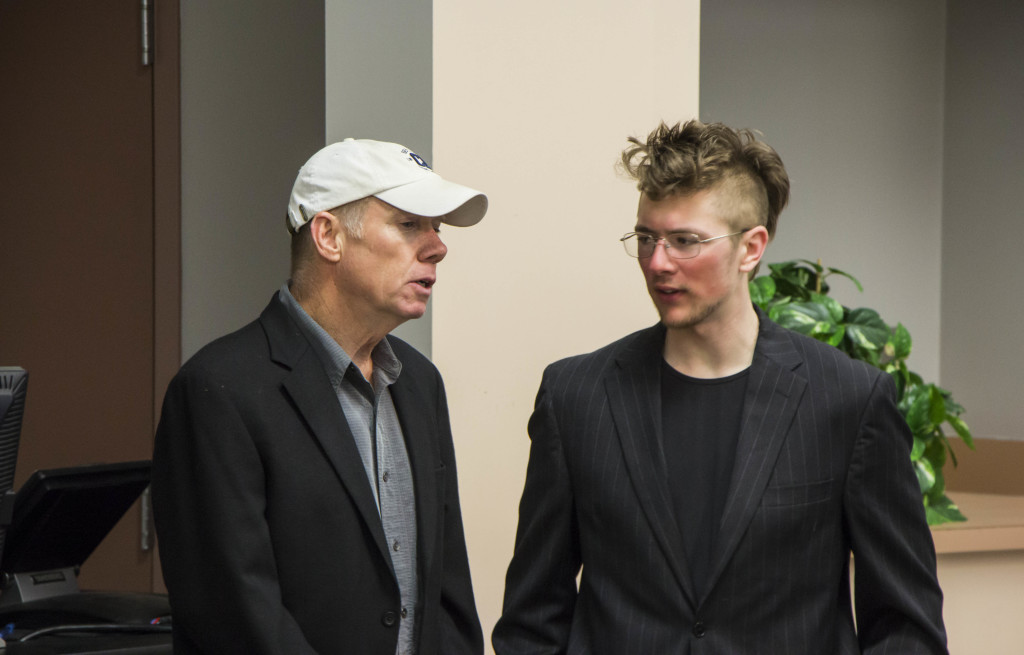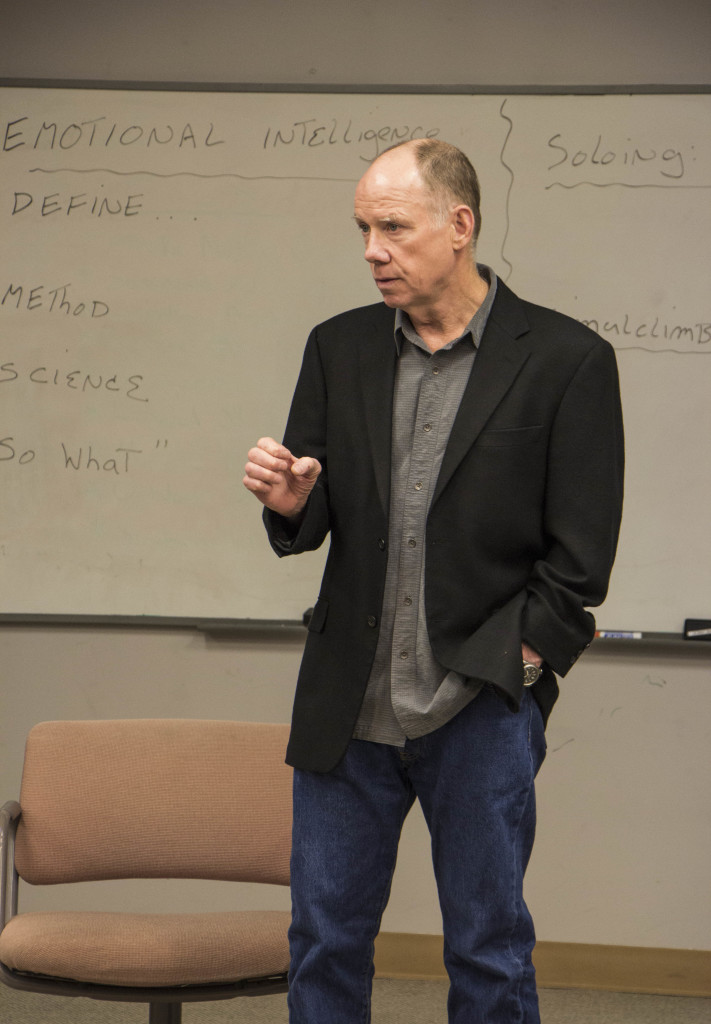 By Cayley Eller
By Cayley Eller
Following our recent spring break a handful of lucky Alaska Pacific University students and administrators had the pleasure of hanging out with former APU instructor David McGivern. Dave, who was a beloved member of the faculty at APU was a prominent figure in developing the climbing program at the University, as well as establishing many of the courses within the Outdoor Studies Department. The Alpine Club was honored to host Dave at their annual event which features guest speaker(s) from the climbing community to discuss stories, experiences and ideas with the community of alpine and adventure enthusiasts at Alaska Pacific University.
The event was introduced with Dave’s title “Teaching Climbing through the lens of Emotional Intelligence”. He used emotional intelligence as the bedrock for this discussion on climbing and outdoor programming.
Dave began the discussion with “attitude”. How is attitude translated to outdoor programming and adventuring? As a Professor in the Outdoors Studies Department, Dave committed himself to understanding his students on a personal level. Through this effort he engaged himself with the idea of “attitudes”. When you are away from the classroom for days or weeks at a time with a group of students, how do you encourage students to have positive, reflective and rational attitudes toward their experiences in the outdoors and the people that are accompanying them? As a teacher and guide on these trips Dave found it to be paramount to construct relationships with his students as a group and individually—to effectively teach a student to be confident in their field, and essentially develop the skills and mental clarity to make quick, rational and appropriate decisions for themselves and others on an expedition.
Capacity to build relationships with those that are in the backcountry with you is a tool that is irreplaceable. This ability to relate to your partners individually in the field allows you to encourage others to know their own ability and strength, both physically and mentally, in the mountains. Yet, these points that Dave highlighted in his lecture come secondary to the fundamental importance of self-awareness. A successful climber must be aware of their own limits, understand how to respond to their partners by encouraging them to be aware of personal limits, and interpret how that combination of knowledge will allow you to succeed in climbing together.
 I suppose these thoughts segue to Dave’s true intention for the evening which was to bring emotional intelligence to the forefront of climbing conversations, specifically at APU. What does emotional intelligence mean to climbers? It means being able to know and learn from the awareness and conditions that you are put in how to best move forward and when to stop. The importance then of emotional intelligence, control of oneself and knowledge of one’s ability are the most determinant factors of our ability to climb–to climb safely and to return home safely with ourselves and our partners. There is no lightness to these concepts.
I suppose these thoughts segue to Dave’s true intention for the evening which was to bring emotional intelligence to the forefront of climbing conversations, specifically at APU. What does emotional intelligence mean to climbers? It means being able to know and learn from the awareness and conditions that you are put in how to best move forward and when to stop. The importance then of emotional intelligence, control of oneself and knowledge of one’s ability are the most determinant factors of our ability to climb–to climb safely and to return home safely with ourselves and our partners. There is no lightness to these concepts.
The talk from Dave held an air of understanding for the culture of risk involved in the act of climbing. Taking certain risks is part of a routine decision we make as outdoor enthusiasts on a regular basis, but we must not become too complacent in doing so. Risk in the climbing world is high and often disproportionate to the act of decision making, this is a point that Dave stressed on multiple occasions. Solo climbing, as Dave explained it, in its very simplicity is an activity for easy and consistent hiking conditions. That being said, a developed sense of emotional intelligence is the only way we can interpret and decide how we will fare in any condition we put ourselves into on a mountain. In the climbing community, mental clarity and emotional understanding hold significant weight when approaching a climb in any regard, be it solo or simul-climbing. Though risk management, risk assessment and skill ability may be common points of discussion in professional climbing circles, the extent to which emotional intelligence becomes a survival tool in the outdoors is an under-discussed issue.
These concepts were hit home with the very real discussion of a death that occurred in the APU community. Dasan Marshall was known in the community as an excellent and passionate climber. He was not someone who made foolish or half-thought-out decisions on a mountain, he was an intelligent climber. His death is something that needs to be discussed because it is not an anomaly in the outdoor and climbing industries. The decisions that are made in the backcountry bring a disproportionate consequence to action reality. Dasan’s accident is the closest example to this, that as students, many of us know. The smallest lapse of judgement can bring the ultimate consequence which we have witnessed in the loss of such a beloved member of our community.
In response to Dasan’s death Dave discussed how we might come to conclusions about the accident (or any climbing accident) and what we can do with the knowledge of events that inflict us with emotional toll. How do we maintain the four pillars of emotional intelligence—self-awareness, self-regulation, empathy and social skills, when we are back in the mountains ourselves? The reality check that comes with tragedies such as Dasan’s, serve as reminders and lessons for those of us that it will not prevent from enjoying the backcountry, in all of its’ glory and dangers. It is important to treat the event of an accident as a tool for personal growth and development; to not learn from their mistake is to do you a disservice to both them and ourselves. The most humble and honorable thing we can do is to become more self-aware, more self-regulated, and more empathetic—in a situation that begs us to do the opposite.
“How do we come to understand Dasan’s death?” asked Dave McGivern. That was the million dollar question to end the night, and one that stuck with each member of the audience.
David McGivern thinks about things very carefully. There is a meticulous style to the order in which he engaged with the audience. He wanted to draw on the audience to further the understanding and philosophies that he has presented, whether he was looking to pique a specific conclusion from the audience or he was looking for something that he had not thought up on his own yet, the question was left open for each of our interpretations.
